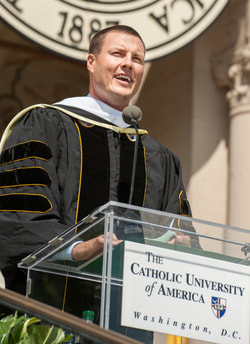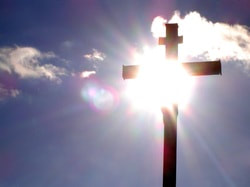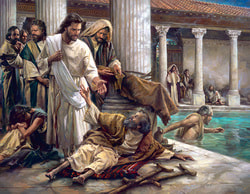|
Who is stressed out? Anxious? Eager? Caught in this dreadful summer heat and growing tired of their daily routine? “Come to me, all you who labor and are burdened, and I will give you rest,” says Jesus in our Gospel today from Mt. 11:28-30. Who doesn’t like rest? It’s summer, we are in Ordinary Time, and it’s the middle of the week. I don’t know about you, but I could use a little spiritual-pick-me-up! The long days of childish summers spent without a care in the world are gone, and schedules, busyness, and work have taken their place.
Where is God in your day? Is He in the woman at the desk next to you, the one who always greets you with a cheerful “Good Morning”? Is He in the children you see every day, the ones who gleam with such exuberant joy? Is He in the man who doesn’t walk by the homeless man, but generously hands him a full lunch and some change? Is He in the person others see in you? Is He in the rosary you keep in your pocket, but never use regularly? Is He in the daily readings you find here but would never consider forwarding to a friend that day? Is He in you? In today’s society, the world rushes from one thing to the next without hesitation or a second thought. It is often difficult to find a moment for ourselves, and those moments are often eaten up by technology or more busyness. What if we begin to use that moment to ourselves as a moment with Christ? That intentional moment could be found in prayer or contemplative silence, or it could be speaking or listening to those around us. What if we just closed our eyes, imagined Jesus with us, and sat with him for a while. Would your heart be open to listen or would it not even recognize Him with you? Today’s Gospel says, “Take my yoke upon you and learn from me, for I am meek and humble of heart; and you will find rest for yourselves. For my yoke is easy, and my burden light.” As we continue on this journey of the New Evangelization, we are called by the Holy Father to infuse our busy lives with the peace and love of Christ. In Christ’s peace we find His love, and in His love we find our peace. Krissy Kirby is a recent graduate of The Catholic University of America in Washington, D.C. with a degree in Early Childhood Education.
0 Comments
Transitions can sometimes be the hardest part of our lives. Often, transitions are filled with hope and anticipation, but other times they are filled with fear and anxiety. The transitions I’m currently thinking of include moving, new jobs, graduation, marriage, children, losing a loved one, and many more. Everybody's lives change, both in good times and in more difficult ones; the key is figuring out how to maneuver through those changes and create new beginnings.
Transitions often change our faith-based routines. Prayer, Mass times, and proximity to a Church are the top contenders for what may be lost or overlooked in these fearful times of anticipation and uncertainty. What we forget is that prayer and dependence on Christ are the most important things to hold onto. As Psalm 77: 1-2 says, “I cry aloud to God, aloud to God, and he will hear me. In the day of my trouble I seek the Lord…” When we are afraid or in trouble, God is there. He is there in the easy and joyful transitions, too, waiting for gratitude and recognition. Our faith is the vehicle by which our lives are maneuvered. All of life’s stop signs and road blocks, in each pit stop and flat tire, in every new paint job and deep clean, Christ is there as our GPS if we let him. No matter how long it takes to recalculate our journey through transitions, God is with us and wants us to ask for guidance. I have recently graduated from college, a time that brings many changes. In our commencement address, we received one solid takeaway: nunc coepi, which is Latin for, “Now I begin.” I’m realizing, as did our incredible Catholic speaker, that in all of life’s transitions, nunc coepi is applicable. If during life’s stop signs, we say, “nunc coepi,” we can continue with our job searches. If at a financial roadblock, we say: nunc coepi, recognizing that God will provide and make sure the bills are paid. It can be a simple phrase that helps us recognize the blessings, and continue on with whatever God’s plan for happens to be. The faith behind the phrase nunc coepi shows faith in God’s plan for each of us, and through each of life’s transitions. My favorite verse in the Bible comes from the moment that Gabriel tells Mary that she has been chosen to be the Mother of Jesus, and says in Luke 1: 37-38, “Fear not! For nothing will be impossible with God.” And then Mary responds with, “Behold, I am the handmaid of the Lord, let it be done to me according to Thy Word.” Like Mary’s response to her own life-changing moment, can we say “Yes” to God? Can we, in our own transitions, continue to say, nunc coepi? Now I begin. Krissy Kirby is a graduate of The Catholic University of America with a degree in Early Childhood Education. Is anyone else feeling kind of burned out? I know I am! It's certainly getting to that time of the year. For those of us in school, finals are looming and the papers and projects are piling up, and college seniors are getting ever closer to their graduation date, which means realizing that the real world is almost here. For those in the professional world, it is tax time, which adds to the level of anxiousness. For us as Catholics, we’re also reaching the end of our Lenten journey, and even that can make us feel tired. Easter is just around the corner and it is easy to get lost in the preparations that surround this. We plan celebrations to spend time with those we love, and we can easily get lost in the stress of getting ready for Easter.
Being stressed can feel overwhelming. When I feel stressed it can be hard to take a step back and look objectively at all the things I have to do. Everyone has different ways to manage stress. Some people like lists and prioritizing tasks. Others need to take time to relax before tackling large projects. One of the things I have found that helps me is praying the serenity prayer: God grant me the serenity to accept the things I cannot change; courage to change the things I can; and wisdom to know the difference. There are some things that we are stressed about that we can change. We can work on our time management so big projects don’t pile up. Proactivity can do wonders for stopping stress before it happens. But often in life there are things that stress us out where there is no immediate fix. It is these times that the serenity prayer is especially applicable. Worrying sometimes does more harm to our mental health than anything else. It is in these times of worry where we need to turn to God for help. Taking time during especially stressful points in our life to turn to God in prayer can make all the difference. This coming Sunday is Palm Sunday and we will hear the gospel reading of Christ’s Passion. As we end our Lenten journey, remember that Christ suffered for us and suffers with us. We are not on this journey alone, even though it is easy to feel alone when we’re especially busy. Keep Christ in all that you do, especially during the stressful times. As we move into the Easter season, try not to get lost in the stress. Take time to remember what Easter celebrates and feel the joy that comes with the Lord’s resurrection! Rebecca Ruesch is the Blog Editor for the Catholic Apostolate Center "The apostolate of the laity derives from their Christian vocation and the Church can never be without it."
These words come from the opening lines of the “Decree on the Apostolate of the Laity” (Apostolicam Actuositatem), one of the nine decrees that come out of the Second Vatican Council. They are quite moving and powerful documents that were handed down to us by the council fathers. This particular document on the laity shows that the Church is dependent on the apostolate of all people. But the term “apostolate” seems so daunting; clearly the word is rooted in the idea of being an apostle. I tend to think back to the Twelve Apostles, which creates a certain amount of anxiety. How can I even think about living up to the great examples of these twelve? Yet they are our example, and our apostleship is essential to the life of the Church. In the Church we tend to use the word apostle quite a bit and in many different ways. It appears in terms such as: apostolic, apostolate, and apostleship. To find a secular answer, I looked up the word “apostle” in a Merriam-Webster dictionary. In using a dictionary, my hope was that I might come to a better understanding of what it means to be an apostle. The first definition that I came across for apostle was "one sent on a mission." This first meaning really helps expand the idea of the New Evangelization in simple terms. The discovery of this definition led me to formulate the following question: "What is our mission as baptized Catholics?" This is a very important question that has been the subject of major debate. A simple answer is that we are called to go out into the world around us and proclaim the Good News of our Lord, Jesus Christ. How this is accomplished is a decision that must be made by each one of us. We must find our own niche in the greater mission of Christ. We have been given a divine mission that we must go out and complete. An interesting dilemma of this universal apostolic call is that for some reason people tend to shy away from it. I think that people tend to think that they are not worthy of such a calling or that they are not holy enough. Nothing could be further from the truth. We have all been given the necessary gifts from God to be able to be an apostle. These gifts are not always automatically known to us. Because of this, it is essential that we go out into the world and discover what our God-given talents are. Once we have become aware of our gifts, the task at hand becomes more manageable and attainable. Personally, I have found that being an apostle in the world today can be quite difficult. Through my active search and prayer to recognize the gifts and talents God has given me, I have discovered that I am someone who is easy to talk to. In response to this realization, I make myself available for people, especially my close friends, and I make sure that I both listen and give general advice when necessary. Doing this, however, can be difficult because there are many instances when time is limited, and I need to make a decision about what to put on hold. This can be difficult, so I stop to think about the things on my agenda versus the needs of the person seeking my counsel. Taking this time to reflect makes the decision quite clear. I developed a series of questions that has helped me in this process. I’ve found it very beneficial to go over them every now and again, particularly during the Lenten season. The questions are: Do I understand what it means to be a true apostle of Christ? Do I have an understanding of my mission at this current time in my life? Am I making decisions that help in my mission? Do I understand the gifts that God has given me to fulfill my mission? Do I thank God for these gifts and abilities? My hope is that you find these questions as helpful as I have. Mary, Queen of the Apostles, pray for us! Pat Fricchione is the Research & Production Associate for the Catholic Apostolate Center. Editor's Note: This post was originally published on March 27, 2012. I have a very distinct memory from when I was a little girl (okay, twelve years old…) of anxiously awaiting the Christmas morning tradition of opening up Christmas presents. I was so excited that instead of waiting for the parental mandated 6:15am wake up call, I did it my way. I changed the time on my alarm clock, woke up my whole family and demanded that we start Christmas a little early. This moment of impatience several years ago plays into a much larger reality about this world that we live in – we are so anxious to get to the final destination as quickly as possible that we forget that the journey is just as important as the destination.
That is what Advent is – the journey to Christmas. The word itself comes from the Latin word adventus, which means “coming.” In the midst of the craziness of the holiday season–peppermint mochas and Hallmark Christmas movies included—it is natural to feel like these weeks leading up to Christmas are all about the countdown, and not about the coming. Just as I was all too anxious and turned the clock forward to get my Christmas day started, it is easy to wish away these days of simple waiting and trade them in for the hustle and bustle of Christmas Day. In an effort to more fully appreciate this journey to December 25th, it is necessary to find ways to live out this coming in our own lives. Practically, what does this mean? It means recognizing that the Advent journey requires silence, prayer and most importantly perseverance. Although everyone loves a good peppermint mocha, it is through these three things that we can ready the way for the coming of our Lord at Christmas. Although seemingly impossible, finding silence among the chaos of these days can be done in simple ways–whether it is turning off that Josh Groban Christmas song that has been playing on repeat in the car or taking the chance to catch one’s breath between glasses of eggnog at a family Christmas party. Finding times for prayer can be as unassuming as waking up five minutes early to read that day’s Mass readings or saying a Hail Mary when we are stressed. Lastly, perseverance is not only a necessity of the Christian life, but a necessary part of a peace-filled Advent. The most beautiful part of these days before Christmas is that the destination of our journey is not a rigged alarm, but God Himself in the unassuming form of a baby. This innocence of the baby Jesus reminds us that this season is a time for simple acts of faith, acts of faith that both allow us to appreciate the gift that is waiting for us and the journey that makes it possible. Lauren Scharmer is a senior at The Catholic University of America and is active in retreat and youth ministry in both the Archdiocese of Washington and the Diocese of Arlington. The story of the Blind Bartimaeus is one of the most telling encounters between Jesus, our Savior, and our broken humanity so critically in need of salvation. The truth is we are all Bartimaeus’; we all deeply desire to receive the sight or “insight” only the Lord can provide.. But what is it that we long so much to see? And, what keeps or blinds us from seeing it?
I believe, as experienced in my own life, we all long to see that which all other sight is meant for, the Way. That is to say, we all long to see the way to our healing, our happiness, our security, but most of all we all truly long to see He who is the Way to our salvation. So what keeps us from seeing Him who is the Way, the Truth and the Life (Jn 14:6)? My own sight has often been blinded by the fears and anxieties brought on by the brokenness of my own human condition and triggered by the brokenness of a fallen world, itself so desperately in need of seeing the way of salvation. This anxiety that so many of us struggle with can lead to a type of spiritual blindness with, perhaps, more drastic consequences than any Bartimaeus’ physical blindness had caused. This spiritual blindness is the type that can challenge or even cripple the strongest of faiths. Yet, like many of the paradoxes found in scripture, this blindness can, through the Grace of God, serve to open our senses to what we must hear: the footsteps of the One who approaches. And if, like Bartimaeus, we come to courageously trust our Lord and learn to turn away from the surrounding fear that disables our discernment, what we really come to hear is His voice calling us; giving us our vocation to come and follow him: “On hearing that it was Jesus of Nazareth, he began to cry out and say, "Jesus, son of David, have pity on me." And many rebuked him, telling him to be silent. But he kept calling out all the more, "Son of David, have pity on me." Jesus stopped and said, "Call him." So they called the blind man, saying to him, "Take courage; get up, he is calling you."(Mark 10:47-49) When I hear the story of the blind Bartimaeus I can’t help but reflect on my own encounter with the living Savior, especially as He passes through my mind and heart amid the pangs of a hostile and blinding crowd of anxious emotions. Another particularly telling part of the story is how Bartimaeus, the “son of honor” repeatedly calls out to our Lord the, “Son of David”. King David was a man, much like Bartimaeus, who was destined for honor and dignity. Yet, he was blinded by his own brokenness and crippled by the powerlessness he felt against his own humanity. King David, like Bartimaeus, in Psalm 51 cried out to God with an unwavering confidence in God’s Divine Mercy. My own battle with anxiety has led me to cherish a deep sense of humility. I am not in control, I don’t have all the answers, I often cannot endure on my own, I need others, I need communion, I need Christ. Moreover, we hear the words of the prophet “be not afraid, I am with you” (Isaiah 41:10). And again, we continue to hear the words of St. Paul and all the martyrs who boasted of their weaknesses which won for them the strength of Christ (c.f. Cor. 12:9-10). So let us cry out! With all humility and confidence and faith in the words of another one of Christ’s redeemed…Domine, si vis, potes me mundare! “Lord, if you wish, you can make me clean.” (Mt. 8:2) Bart Zavaletta is a Theology teacher at Skutt Catholic High School in Omaha, NE. The night before I travel - whether by car, air or sea - I can’t help but begin to feel anxious and get a little overwhelmed about my upcoming journey. No matter how prepared I think I am or how necessary the trip is, I loathe the process of travelling. I’ve never had a ‘bad’ experience, but it isn’t something on my list of things to do every day either. While I’m sure I’m not alone in my sentiment, and there are probably 101 diagnoses as to why I don’t like travelling, I think it boils down to the fact that transition, no matter the circumstances, causes an upheaval of routine.
Throughout our lives, each of us has experienced the anxieties of transition in one way or another: graduating from school and starting a new job; getting married and having children; getting sick or losing a loved one. Every stage of our lives carries with it transition and to some extent, a change in routine. The Book of Ecclesiastes acknowledges this idea in a very poetic way: “There is an appointed time for everything, and a time for every affair under the heavens” (Eccl 3:1). The start of Ordinary Time is no different. While most of us would consider this transition as minimal, the truth is our ‘routine of solemnity’ has come to somewhat of a standstill for the next month. The Solemnity of the Presentation of the Lord (on February 2), and the memorial of Our Lady of Lourdes (on February 11) are among the highlights, but for the non-daily Mass crowd, they will be passed over with little thought. So, the question then becomes, what are we to make of these next few weeks? With less than a month before we begin our celebration of Lent with Ash Wednesday, many of us are tempted to ask what good these next four weeks of green - of Ordinary Time - truly serve? In fact, we might be tempted to brush them aside and regard them as a welcomed break in our otherwise hectic liturgical year. I would suggest, however, that looking at these next four ordinary weeks is essential to our spiritual well-being. Our Catholic faith has a rich history of using the ordinary to reveal the extraordinary. Our sacramental life is centered around the idea that ordinary elements - bread, wine, water, oil, gestures and even people - through the grace of God, constantly reveal extraordinary truths. Even in our secular day to day interactions, we believe that God reveals himself to us through the kind word or action of an ordinary passerby; oftentimes to our amazement. Both the Old and New Testaments tell countless stories of God using ordinary people to bring about His extraordinary plan of salvation: Abraham, Moses, David, Elijah, Elisha, Daniel, Jonah, John the Baptist, Peter and Paul, just to name a few. The lives of the saints and martyrs are no exception. Ss. Francis, Therese of Lisieux, Jerome, Vincent Pallotti, Elizabeth Ann Seton, Francis de Sales, among thousands of others, beautifully exemplify living ordinary lives for the sake of an extraordinary message. Knowing and understanding how God uses the ordinary should be a great source of hope for each of us. It is an invitation for each of us to strip away what we think we need to be and come as we are; in other words, for us to recognize the beauty of our own imperfect humanity. It is through our participation in the ordinary that we enter into a deeper, more honest and fruitful relationship with God, who is perfection. It’s true that this liturgical season, this transition, might bring about some uneasiness or anxiety because it is a break from our recent pomp and solemnity. For some, it might be a minimal, casual transition. And still for others, it might be off their radar completely. Whatever the case, I would suggest making these next four weeks truly ordinary. If we come as we are - as ordinary people - not just to reacclimate ourselves to a different routine, but to enter into an honest dialogue with God, I am confident He will use us in extraordinary ways. This kind of unique and authentic vulnerability is what we are called to, and why we were created. Why not take a little time to participate in it and enjoy it? On January 24th, we will celebrate the memorial of St. Francis de Sales. In his book, The Introduction to the Devout Life, he writes, “When God the Creator made all things, he commanded the plants to bring forth fruit each according to its own kind; he has likewise commanded Christians, who are the living plants of his Church, to bring forth the fruits of devotion, each one in accord with his character, his station and his calling… Therefore, in whatever situations we happen to be, we can and we must aspire to the life of perfection” (Pars 1, cap.3). As we begin this short period of Ordinary Time, we are reminded not of what we lack, but of why being ordinary is so necessary to bring about the extraordinary. We are reminded that each of us have been created as is, to bring about a life of devotion, not for our sake, but for the glory of God. In essence, we are reminded why the green of the thorn, eventually blooms into the white of the rose. Happy Ordinary Time! Jonathan Jerome is the Director of Catholic Campus Ministry at the University of Pittsburgh Johnstown. "The apostolate of the laity derives from their Christian vocation and the Church can never be without it."
These words come from the opening lines of the “Decree on the Apostolate of the Laity” (Apostolicam Actuositatem), one of the nine decrees that come out of the Second Vatican Council. They are quite moving and powerful documents that were handed down to us by the council fathers. This particular document on the laity shows that the Church is dependent on the apostolate of all people. But the term “apostolate” seems so daunting; clearly the word is rooted in the idea of being an apostle. I tend to think back to the Twelve Apostles, which creates a certain amount of anxiety. How can I even think about living up to the great examples of these twelve? Yet they are our example, and our apostleship is essential to the life of the Church. In the Church we tend to use the word apostle quite a bit and in many different ways. It appears in terms such as: apostolic, apostolate, and apostleship. To find a secular answer, I looked up the word “apostle” in a Merriam-Webster dictionary. In using a dictionary, my hope was that I might come to a better understanding of what it means to be an apostle. The first definition that I came across for apostle was "one sent on a mission." This first meaning really helps expand the idea of the New Evangelization in simple terms. The discovery of this definition led me to formulate the following question: "What is our mission as baptized Catholics?" This is a very important question that has been the subject of major debate. A simple answer is that we are called to go out into the world around us and proclaim the Good News of our Lord, Jesus Christ. How this is accomplished is a decision that must be made by each one of us. We must find our own niche in the greater mission of Christ. We have been given a divine mission that we must go out and complete. An interesting dilemma of this universal apostolic call is that for some reason people tend to shy away from it. I think that people tend to think that they are not worthy of such a calling or that they are not holy enough. Nothing could be further from the truth. We have all been given the necessary gifts from God to be able to be an apostle. These gifts are not always automatically known to us. Because of this, it is essential that we go out into the world and discover what our God-given talents are. Once we have become aware of our gifts, the task at hand becomes more manageable and attainable. Personally, I have found that being an apostle in the world today can be quite difficult. Through my active search and prayer to recognize the gifts and talents God has given me, I have discovered that I am someone who is easy to talk to. In response to this realization, I make myself available for people, especially my close friends, and I make sure that I both listen and give general advice when necessary. Doing this, however, can be difficult because there are many instances when time is limited, and I need to make a decision about what to put on hold. This can be difficult, so I stop to think about the things on my agenda versus the needs of the person seeking my counsel. Taking this time to reflect makes the decision quite clear. I developed a series of questions that has helped me in this process. I’ve found it very beneficial to go over them every now and again, particularly during the Lenten season. The questions are: Do I understand what it means to be a true apostle of Christ? Do I have an understanding of my mission at this current time in my life? Am I making decisions that help in my mission? Do I understand the gifts that God has given me to fulfill my mission? Do I thank God for these gifts and abilities? My hope is that you find these questions as helpful as I have. Mary, Queen of the Apostles, pray for us! Pat Fricchione is the Research & Production Associate for the Catholic Apostolate Center. |
Details
Archives
July 2024
Categories
All
|
About |
Media |
© COPYRIGHT 2024 | ALL RIGHTS RESERVED








 RSS Feed
RSS Feed